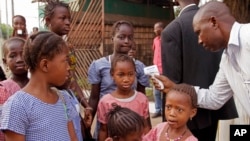This week's report that the death toll from West Africa's Ebola epidemic has topped 10,000 is a reminder that many challenges remain to bring the number of cases down to zero, health experts say.
The three most-affected Ebola countries — Guinea, Liberia and Sierra Leone — appeared in early January to be making progress against the disease. The number of new cases fell from a high of more than 1,000 per week in September and October to an average of 100 per week.
Liberia, where the last known Ebola patient was discharged March 5, has had no new cases in nearly three weeks, the World Health Organization said.
But in Guinea and Sierra Leone, continued pockets of resistance to recommended anti-Ebola measures have continued to push up the caseload and death toll. The WHO said 116 new cases were reported in these two countries this week.
Dr. Francis Kateh, deputy incidence manager of medical response and planning for Ebola in Liberia, said he understood the dangers of complacency.
"In September and October, we had many people dying, so it was the disease finding us," he said. "But now, if you have just one or two cases coming every three to four days, people go into a denial phase. They say, 'Oh, I don’t have Ebola, it’s just malaria,’ and so forth. So when people are wavering, this is when you can reignite the [outbreak].”
Kateh said response teams were continuing to monitor communities for suspected cases and that mechanisms were in place to ensure that if a case did arise, it could be quickly identified, isolated and treated.
But experts said such measures work only when communities are on board.
In Guinea, for example, 13 unsafe burials were reported in the week ending March 8, according to the latest figures from the U.N. Mission for Ebola Emergency Response (UNMEER). More than half of patients who succumbed to Ebola in Guinea during this time died within their communities, as opposed to seeking care at treatment centers. UNMEER said this was “indicative of the significant challenges in terms of contact tracing and community engagement.”
Guinea’s spokesman for the Coordination of the Fight against Ebola, Fode Tass Sylla, told VOA in Conakry that "today we are battling an enemy, and it’s not just the Ebola epidemic. It’s the epidemic of the reticence, of rebellion, one can even say, among certain people. We all know now what Ebola is and how it is transmitted. But some people still categorically refuse to allow health workers to take care of them.”
Sylla said that while Guinea now has the technical capacity and personnel to end the outbreak, getting to zero cases will require that people stop hiding sick family members from health teams, stop participating in unsafe burial practices such as the washing and touching the body, start allowing themselves to be contact-traced and stop traveling while sick.
Experts said it’s particularly important to get to zero cases, in all three countries, before the region’s rainy season begins next month. Many roads will become impassable, making it difficult for response teams to reach communities and for people to seek medical care.




